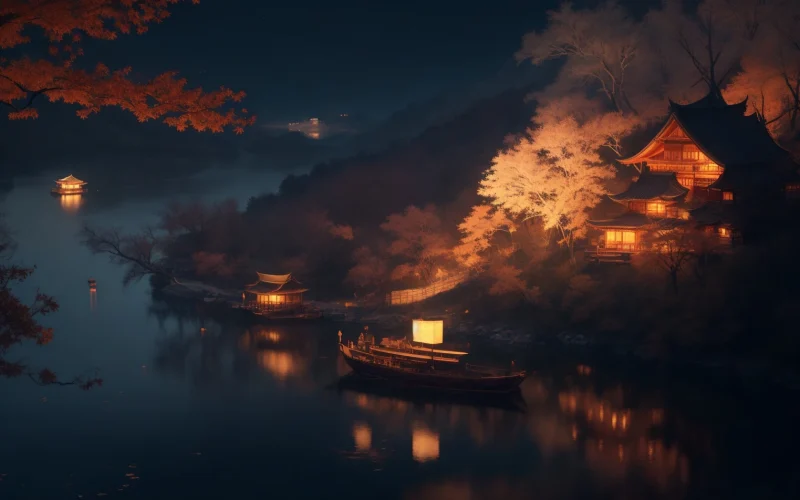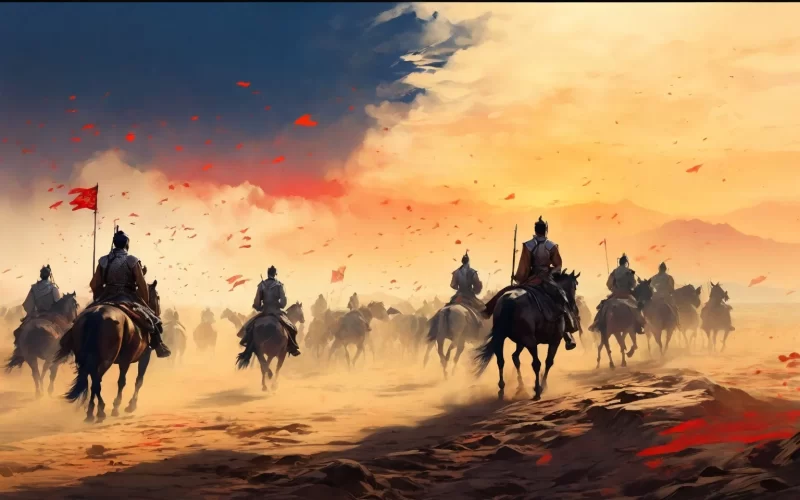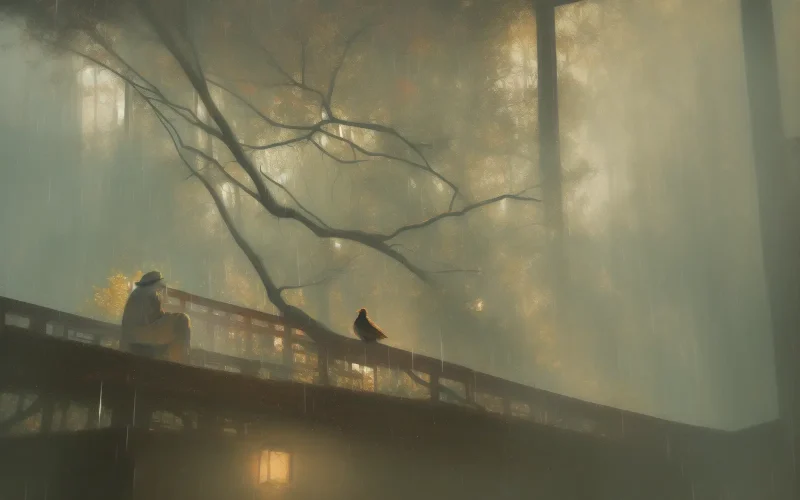While I watch the moon go down, a crow caws through the frost; Under the shadows of maple-trees a fisherman moves with his torch; And I hear, from beyond Su-chou, from the temple on Cold Mountain, Ringing for me, here in my boat, the midnight bell.
Original Poem
「枫桥夜泊」
张继
月落乌啼霜满天,江枫渔火对愁眠。
姑苏城外寒山寺,夜半钟声到客船。
Interpretation
Composed between 756-758 CE during Emperor Suzong's reign amidst the turmoil of the An Lushan Rebellion, this poem captures Zhang Ji's melancholy while traveling through Jiangnan after failing the imperial examinations. The title "Night-Mooring at Maple Bridge" precisely frames the temporal (nocturnal) and spatial (a Suzhou canal bridge) coordinates of this lyrical moment. Though merely four lines, its perfect fusion of scene and emotion has made it one of Tang poetry's most enduring masterpieces.
First Couplet: « 月落乌啼霜满天,江枫渔火对愁眠。 »
Yuè luò wū tí shuāng mǎn tiān, jiāng fēng yú huǒ duì chóu mián.
The moon descends, crows caw, frost fills the sky, By mapled banks, fishing flares haunt my sleepless sigh.
This couplet paints the poet's nocturnal vigil through sensory impressions. "Descending moon," "cawing crows," and "sky-filling frost" construct a desolate nightscape where even ordinary elements—riverside maples and fishing boats' flares—become spectral companions to insomnia. The pivotal "sleepless sigh" transforms scenery into psychological landscape.
Second Couplet: « 姑苏城外寒山寺,夜半钟声到客船。 »
Gūsū chéng wài Hánshān Sì, yèbàn zhōngshēng dào kè chuán.
Beyond Gusu's walls, from Cold Mountain Temple, Midnight bells reach this wanderer's vessel.
Here auditory revelation breaks the visual stillness. The geographic markers ("Gusu"/Suzhou, "Cold Mountain Temple") anchor the scene, while "midnight bells" perform spiritual alchemy—their reverberations crossing physical and metaphysical boundaries to touch the solitary traveler. This sonic intrusion becomes the poem's transcendent pivot.
Holistic Appreciation
The poem progresses from scene to emotion, then from emotion to spiritual transcendence, demonstrating rigorous structure and clear thematic development. The poet first establishes the solitary setting of "night-mooring at Maple Bridge," employing imagery like "the moon setting, crows cawing" and "frost filling the sky" to create an atmosphere of desolate chill. The subsequent "maple trees and fishing lights" scene mirrors inner loneliness and melancholy. The transition to the "Cold Mountain Temple's" midnight bell—both an actual auditory experience and a symbol of spiritual solace and Zen awakening—completes this artistic journey. With its poignant beauty, measured rhythm, and harmonious blend of visual imagery and philosophical depth, the poem quintessentially expresses the poet's travel-weariness and profound artistic sensibility.
Artistic Merits
- Harmonious Fusion of Scene and Emotion: The poem employs serene and chilly scenery to accentuate the poet's solitude and melancholy, achieving the artistic effect of "emotion within scenery, scenery revealing emotion."
- Contrast of Sound and Silence, Interplay of Movement and Stillness: Elements like "crows cawing" and "fishing lights" interweave with "frost filling the sky," balancing motion and tranquility. The "midnight bell" disrupts the silence, enhancing spatial and temporal depth.
- Condensed Imagery, Profound Meaning: Highly evocative images such as "the moon setting, crows cawing" and "Cold Mountain Temple's bell" are powerfully expressive, becoming timeless, celebrated lines.
- Ethereal Rhythm, Zen-like Subtlety: The concluding lines, with their transcendent bell imagery, not only echo the earlier mood of "sleepless with sorrow" but also introduce a touch of Zen-like detachment from worldly concerns.
Insights
This poem not only exemplifies the Tang dynasty poets' characteristic travel-weariness but also conveys, through the fusion of emotion and scenery, the nuanced experience of seeking solace amid hardship. By using the external "sound of the bell" to reflect inner resonance and epiphany, the poet reveals how one may perceive life's transcendence even in sorrow. In today's restless and chaotic reality, the poem's clarity and ethereality continue to offer modern readers a sense of peace and contemplation.
Translator
Kiang Kanghu
About the poet
Zhang Ji (张继), date of birth and death unknown, was a native of Xiangfan, Hubei Province. He was admitted as a scholar in 753 AD. His poems are mostly about traveling to places of worship.












